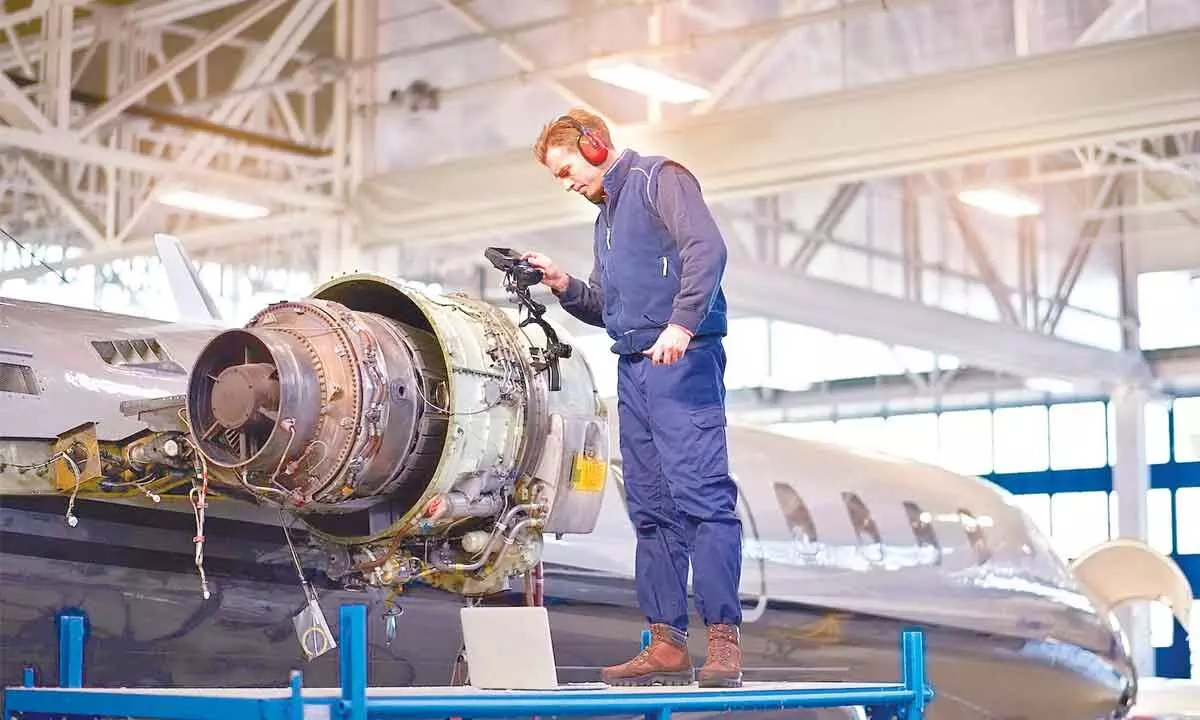Aerospace Engineering: A career to pursue

Aerospace engineering is the primary field of engineering concerned with the development of aircraft and spacecraft. It has two major and overlapping branches: aeronautical engineering and astronautical engineering. Avionics engineering is similar, but deals with the electronics side of aerospace engineering.
Aerospace Engineering or Aeronautical Engineering is a branch of engineering that deals with the design, development, construction, testing, and operation of vehicles that operate in the Earth's atmosphere or in space. In comparison to ground based systems, such mechanisms must meet extremely strict requirements for optimality and reliability.
This needs precise theoretical and experimental understanding of a number of events, and performance forecasts of a variety of complex systems. Manufacturing, analysis and design, research and development, and the federal government employ the majority of aerospace engineers.
Students, particularly in Artificial Intelligence AI, Machine Learning, and Aerospace Engineering, have a wealth of opportunities due to the ever-changing technological landscape. While AI and machine learning have gained popularity in recent years, India is still in its infancy in the field of aerospace engineering.
Aerospace Engineers must still understand basic aerodynamic concepts and have a working grasp of aircrafts power plants such as turboprops, piston engines, and jets. An aerospace engineer's job entails designing aircraft, spacecraft, satellites, and missiles. Furthermore, these engineers evaluate prototypes to ensure that they perform as intended. Engines, airframes, wings, landing gear, instruments, and control systems are among the subassemblies and components designed by these individuals for these airplanes.
How to get into Aerospace Engineering
Candidates must have passed their 10th grade science and math examinations.
For general category students, a score of 50% is required, and for reserved category students, a score of 45 percent is required. The easiest strategy to choose your programme is to think about the aspect of aerospace you are most interested in. Are you more interested in research and development or in design and manufacturing? Apply to the programmes that are most similar to your goals.
In the discipline of Aerospace Engineering, there are numerous courses offered. In this field, you can get an advanced diploma, Bachelor of Technology (B.Tech) a four-year degree programme, Master of Aerospace Engineering (MAE), Master of Science in Aeronautics & Astronautics, M. Sc. in Aerospace Engineering or a Phd.
To apply for continued study in this discipline, you must be a graduate of the Science stream. It also encompasses the specialized study of different engineering areas such as Instrumentation and Control Engineering, as well as Software Engineering. Some schools and universities join with local businesses to establish cooperative programmes that provide students with practical experience while they complete their studies. Students can obtain useful experience while also funding a portion of their school through cooperative programmes and internships.
Career scope in Aerospace Engineering
To enhance cost, effectiveness, and efficiency, industries are increasingly resorting to flying technology. Engineers in the aerospace industry are paid more than engineers in other fields. For the past few decades, the demand for aerospace engineers has been steadily increasing. Students are becoming increasingly interested in this subject as demand grows. Aerospace engineers can work for the government as well as the private sector. Aerospace engineers have numerous work options both in India and overseas.
Because the aviation and space industries are expanding at such a rapid rate, qualified aerospace engineers will find numerous work possibilities in a variety of fields. An aeronautical engineer is one of the top five most well-paid technical professionals. If you want a tough profession that will take you all over the world, aeronautical engineering is the field for you.
Professionals who operate in the aerospace industry can work alone or as part of a team. They perform research, as well as design and construct vehicles and systems for use in the atmosphere and space. Successful aerospace professionals have the necessary educational background, excellent communication skills, and a desire to work as part of a team. A wide range of aerospace career disciplines provide prospects for great job satisfaction and good pay.
(The author is the Chancellor of Sanskriti University)
Job options in Aerospace Engineering
After the completion of degree programme, candidates may expect a salary package starting from Rs 6 to 14 lakh per year and may get upto Rs 24 lakh depending on experience. If you're skilled at Physics, Math and Science, this field offers numerous options including positions at high level organizations such as:
♦ Defense Research and Development Organization (DRDO)
♦ Air India
♦ Mahindra Aerospace
♦ Aeronautical Development Agency (ADA)
♦ Civil Aviation Department
♦ National Aerospace Laboratories (NAL)
♦ Indian Space Research Organization (ISRO)
♦ Tata Advanced System
♦ Hindustan Aeronautics Limited (HAL)
♦ Pawan Hans Helicopters
♦ Aerospace engineer
♦ Design engineer
♦ Higher education lecturer
♦ Maintenance engineer
♦ Thermal Design Engineer
♦ Manufacturing systems engineer
♦ Assistant Technical Officer
♦ Flight Technicians
♦ Automotive engineer
♦ Rocket Scientist
♦ Control and instrumentation engineer
♦ Product designer
♦ Aircraft Production manager
♦ Quality manager










